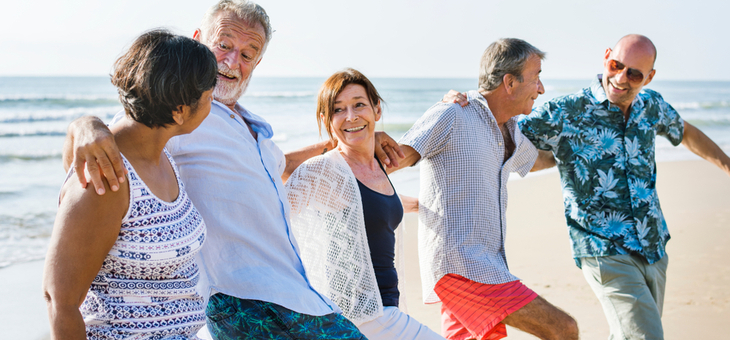Older Australians are well placed to ride the pandemic storm, with the overwhelming majority feeling positive about their safety and security, and mental, physical and financial health, despite significant risk factors such as employer age discrimination, pandemic-induced social exclusion, government entitlement confusion and diminished sex life.
And old is the new young.
Surveying more than 7200 Australians over the age of 50, the YourLifeChoices Older Australians Wellbeing Index (YOAWI) aims to provide a holistic barometer of attitudes and behaviours of the older demographic across four core wellbeing tenets and topical events.
The survey found an overwhelming majority of older Australians (70 per cent) felt younger than their chronological age, with one in five of those feeling more than 10 years younger.
“Age is just a number,” says YourLifeChoices member Hola.
“Attitude towards life keeps you either old or young. A good sense of humour is so important. I’m now in my late 70s but feel in my 30s!”
Read more: Ageism is bad for your health
Strong financial wellbeing, particularly as a result of owning their home, was a catalyst for feelings of safety and security. Overall, almost three in four (73 per cent) indicated they were confident handling their finances.
“The survey results fly in the face of common perceptions of older Australians,” says YourLifeChoices publisher Leon Della Bosca. “The data proves that older Australians are not as mentally and physically fragile as we may otherwise be led to believe.
“Many are feeling relatively positive about their finances too. It’s easy to forget that this demographic holds approximately 50 per cent of the country’s wealth and 46 per cent of its disposable income.
“The narrative around older Australians is far too often a negative one. The thoughts and feelings of this demographic can often go missing in the public eye or simply be held to historical stereotypes.
“The aim of this inaugural wellbeing index was to dig a little deeper to truly understand how over 50s are really feeling.”
Three in four respondents felt comfortable with their finances, but one in four cited a lack of understanding of government pensions and allowances and only half (50 per cent) said they had a good understanding of superannuation.
One of the biggest risks to wellbeing was age discrimination, with 65 per cent experiencing some form of discrimination and 72 per cent saying they had witnessed it first-hand.
“I just feel invisible sometimes,” said one YourLifeChoices member.
“Grey hair makes people transparent to opportunities,” said another.
“People seem to think because I am old that I have lost the ability to think or reason. I can still spell polytetrafluoroethylene!” added another.
Being categorised as ‘old’ and being called ‘dear’ and ‘love’ also rubbed many up the wrong way.
Read more: Ageism is a part of daily life for older Australians
The factors that most positively affected wellbeing were health, food, family and financial comfort – and a strong sense of purpose.
“As a retiree, your main concern is health, second is financial security, then the family around you and, lastly, to have a good government that knows how to address the needs of the older society,” says one YourLifeChoices member.
In terms of physical and mental wellbeing, family (53 per cent), diet (49 per cent), relationships (46 per cent) and exercise (45 per cent) ranked as having the strongest positive impact.
YourLifeChoices members also rated many silver linings outside of the ‘big four’ as having a positive impact on wellbeing.
“Keeping my motor car shining. I love motoring,” said one member.
“The ability to have my own peace of mind, to not dwell on negative news,” said another.
“Something to work towards. A sense of fulfilment. Looking forward to a holiday,” added another.
Other factors included being in a loving relationship, having a positive attitude and being involved in the community.
Even something so simple as the weather had a positive impact on many a member’s wellbeing.
The negative impacts of age discrimination were felt more by older Australians than the negative impacts of alcohol and recreational drugs. And while the majority of respondents were content with their financial situation, for 28 per cent of older Australians, the lack of financial security had a negative impact on their wellbeing.
Other negative factors included inability to travel, bad manners, slipping standards, chronic health issues and climate change.
The government, including Services Australia and Centrelink, also copped flak for negative effects on older Australians, as well as the lack of jobs available for older people.
Read more: JobMaker claiming the jobs of older Australians
While still rating in the positive at 109, mental health took a beating in 2020, especially during lockdowns. As a result, one in three respondents rated their social life as poor or very poor, and one in four respondents reported a disconnection from Australian society.
“Much like large portions of society last year, it’s not surprising that COVID-19 also took a mental toll on this demographic. Social isolation is a serious concern, so it will be interesting to see how this pattern evolves in future indexes as the vaccine rolls out across the country,” said Mr Della Bosca.
“One of the positive outcomes of the pandemic has been that we’ve seen a real return to old community values, such as looking after and talking to your neighbours, supporting local businesses, and getting involved in community organisations or volunteering groups. This will have huge impact on the lives of older Australians.”
Read more: The underestimated link between home and happiness
How do you rate your wellbeing? What are the main positive and negative factors that contribute to your wellbeing?
If you enjoy our content, don’t keep it to yourself. Share our free eNews with your friends and encourage them to sign up.

